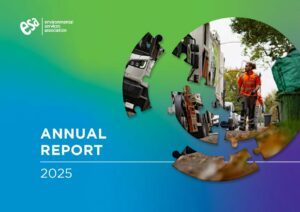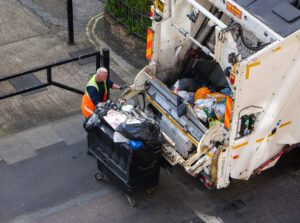The private sector has been doing a lot of the “heavy lifting” to roll out new services to comply with the requirements of Simpler Recycling, according to panellists speaking at the ESS Expo this week.
A panel of waste industry experts, speaking on the Collections and Transport Stage at the ESS Expo yesterday (Wednesday 17th September), explained that implementing the changes required by the regulations was “challenging” and being done to short timescales.
Head of Recycling Policy at the ESA, Patrick Brighty, chaired the discussion and opened by explaining the changes to the regulations which, from April this year, require businesses of more than ten full time equivalent employees (at a corporate level) to separate food waste, recyclable materials and residual waste at their business locations
From 2026, households across England will be brought into this system and local authorities will be legally required to offer a greater and more consistent range of collection services. From 2027, this will also include the introduction of films and flexible packaging, which the panellists described as offering additional challenges – particularly around market demand for this grade of material once collected separately.
Panellists described the challenges of rolling these service changes out, which require hundreds of thousands of new containers; hundreds of new vehicles; new employees and training; and working with customers to help them understand their obligations under the new regulations.
Carla Brian, Head of Partnerships at Biffa, explained that in the absence of widespread communications from Government, some customers were reluctant to follow the advice of commercial operators through concern that they were simply being sold additional services.
She said: “It’s been a really short space of time [to implement] and has been a real challenge. Our operational teams have gone above and beyond and we’ve risen to the challenge but lots of the heavy lifting is being done by the private sector and there hasn’t been enough awareness-raising officially with businesses.
“There has also been a big challenge to work out which companies are in scope. We serve just shy of 200,000 locations in England, so it’s a huge undertaking to work out who is in and who is out.”
Melody Carraro, Senior Policy Manager at Veolia said that a lack of policy certainty, and official communications and guidance coming at quite a late stage, had contributed to a “bottleneck” in accessing some of the infrastructure needed to deliver the new services, such as ordering containers and hiring new staff.
Panellists discussed the cumulative effect of various Resources and Waste Strategy policies and the impact this has on investment and phasing of changes.
Carraro explained that Materials Recycling Facilities (MRFs), for example, may need more manual pickers to separate items and address contamination in the short term, but that the introduction of a Deposit Return Scheme (DRS) after Simpler Recycling would introduce further changes to sorting requirements so there was “no point” changing the architecture of MRFs to accommodate Simpler Recycling in the short term. Carraro also added that permitting, planning and licensing also needed to be factored into the process of change and that these often had long lead times.
Tom Mockridge, Director at Recorra, said that it was important not to look at Simpler Recycling impacts in isolation.
He said: “You have to consider DRS, and the introduction of film, which are going to place quite big and scary requirements on MRFs across the UK, and which will become a big deal in 2027.”
Asked about the health of offtake markets for sorted materials, Mockridge said: “Generally, offtake of materials are okay, except plastics is a concern and film will be a concern. Once all the PET bottles are taken out by DRS, we’ll have a relatively low grade plastic product which could be problematic to get rid of and which could push prices up for everyone.”
Carraro echoed this and said that there was concern that some materials and markets weren’t going to scale-up – which was a concern for films and flexible plastics in particular.
The panellists agreed that enforcement needs to be in place to ensure a level playing field and that, while the Environment Agency cannot expect every business to be compliant right away, the strength of enforcement should ramp up quite quickly.




